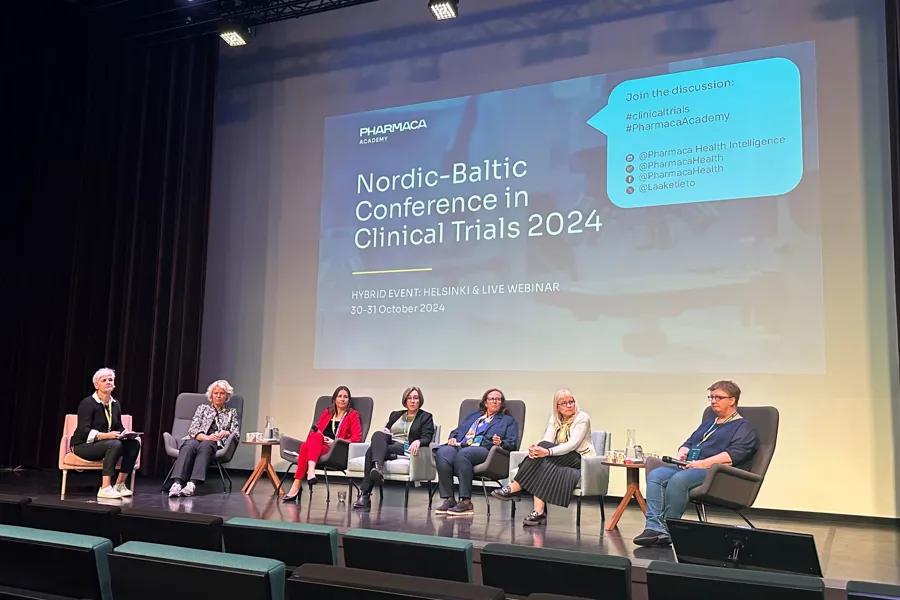NorTrials at the Nordic-Baltic Conference on Clinical Trials in Helsinki
The new regulation for clinical trials, EU Clinical Trials Regulation (EU) No 536/2014, came into effect in the EU on January 31, 2022. Despite the intention of the regulation and its accompanying application portal, CTIS (Clinical Trials Information System), to simplify the approval process, the number of clinical trials is declining, and Europe is losing ground to other regions.

- How can Europe, along with the Nordic and Baltic countries, compete to attract more clinical trials?
- What initiatives is the EU undertaking to harmonise and facilitate the application and approval processes for clinical trials?
- How can access to and collaboration on clinical trials across borders be simplified?
These were some of the topics on the agenda at the Nordic-Baltic Conference on Clinical Trials held in Helsinki on October 30-31, 2024. Among the participants were representatives from healthcare, industry, regulatory authorities, academia, and others involved in clinical trials. Norway was well represented with participants from the Norwegian Medicines Agency (NoMA), Inven2, Haukeland University Hospital, The Norwegian Association of the Pharmaceutical Industry (LMI), LINK Medical, Daiichi Sankyo, and NorTrials.
European Initiatives
A representative from the Clinical Trials Coordination Group (CTCG) presented the most significant signal from Europe regarding the importance of clinical trials, through the EU project Accelerating Clinical Trials in the EU (ACT EU). ACT EU has defined 11 focus areas aimed at making the processes concerning innovation and clinical trials more efficient throughout the entire development cycle of a product or treatment.
Another initiative from the European Commission, MedEthicsEU, was established in February 2024 to strengthen cooperation between the ethics committees of all member states. A joint forum for discussion and mutual learning among ethics committees in EU/EEA countries supports further harmonisation of ethical reviews of clinical trials in Europe.
The EU Cross-Border Clinical Trials Initiative (EU-X-CT) aims to systematically collect information on barriers to participation in clinical trials across borders, both within and outside the EU. The goal is to develop recommendations and further facilitate cross-border participation in clinical trials.
Panel Discussion on Clinical Trials in the Nordic Countries
Signe Øien Fretland, head of the NorTrials Coordinating Unit, gave a presentation about NorTrials and participated in a panel discussion on national strategies and best practices for clinical trials in the Nordic countries. Other participants included representatives from Trial Nation (Denmark), Kliniska Studier Sverige (Sweden), the Swedish Medical Products Agency (Läkemedelsverket), the Finnish Medicines Agency (Fimea), and the Finnish Ministry of Social Affairs and Health.
The panel discussion clearly highlighted the desire for greater collaboration across borders within the Nordic region. While the populations of the Nordic countries are small, collectively they are substantial. Therefore, it could be a significant advantage to view the Nordic region as one, particularly in trials involving small populations, such as those with rare diseases, where access to clinical trials is crucial for patients.
Nordic Initiatives and National Networks
A common feature of the Nordic countries is that they have high-quality healthcare systems, good access to healthcare services, and strong health data. The population has great trust in the healthcare system and is willing to contribute. However, to maintain this trust, it is crucial to ensure adequate privacy protection and allow individuals to opt out of the use of their health data. It is also essential to communicate clearly what clinical trials and the use of health data can contribute to in terms of the development of medicines, medical devices, and treatments.
Trial Nation is a Danish public-private partnership established in 2018 through the merging of existing entities, and it has gradually built national networks in several therapeutic areas. NorTrials was launched in 2022 and is strongly inspired by the Danish model. NorTrials was established with six centres, one at each university hospital, each linked to a specific area selected in collaboration with the industry. This decentralised model has helped bring more focus to clinical trials, especially in hospitals that previously had few industry-funded trials.
NorTrials is organisationally anchored in the Regional Health Authorities, while Trial Nation is an independent legal entity. Political focus and support from the government have been crucial for both Trial Nation and NorTrials, contributing to a focus and implementation capacity that otherwise would not have been possible.
In Sweden, efforts are underway to explore the possibility of establishing SweTrial, and a similar initiative is being developed in Finland, which also aims to establish a "one-stop-shop" for clinical trials.
Use of Registry Data to Identify Patients
In Finland, it is possible to use anonymised registry data to determine whether the country has the patient populations the industry seeks for its trials. A recent legal change in Sweden has made it possible to screen registries for eligible patients without an application, although it is unclear whether anyone has used this option yet. In Denmark and Norway, such use is not currently allowed; a formal application process is required to gain access to registry data for research purposes.
Take-home Messages from Helsinki
After two days of rich discussions and new connections with colleagues from the other Nordic countries, the key takeaways are:
- There is political will in all Nordic countries to increase the number of clinical trials.
- Both European and Nordic initiatives and measures are underway to attract more trials from the international healthcare industry.
- We can learn from ongoing projects and organisations across borders.
- There is still work to be done to make clinical trials in Europe more harmonised, especially with regard to regulatory processes and participation across borders.